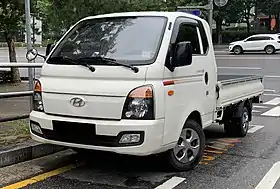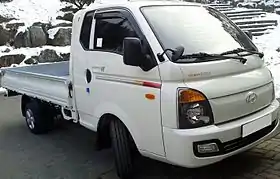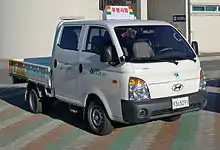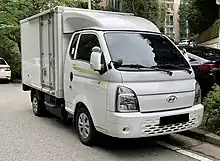| Hyundai Porter | |
|---|---|
 | |
| Overview | |
| Manufacturer | Hyundai |
| Also called | Hyundai H-100 KIA Big Up |
| Production | 1977–present |
| Model years | 1977–1981 1986–present |
| Assembly | Ulsan, South Korea Santa Rosa, Philippines (HARI, 2009–2022) Ninh Bình, Vietnam (HTMV) Bekasi, Indonesia (HIM) Kulim, Malaysia (Inokom) Faisalabad, Pakistan (Hyundai Nishat) Taganrog, Russia (TagAZ) Hsinchu, Taiwan (SYM Motors) |
| Body and chassis | |
| Layout | FR layout F4 layout |
| Related | Kia Bongo |
The Hyundai Porter (Hangul:현대 포터), also known as the Hyundai H-100, is a cabover Pickup truck produced by the South Korean manufacturer Hyundai since 1977.[1]
History
First generation (1977–1981)
The first generation, launched in January 1977, was called the Hyundai HD1000 and was available in both truck and minibus (3 and 12-seater van, ambulance) versions. The truck was called the Porter. The HD1000 was discontinued in 1981.
Second generation (1986–1996)
.jpg.webp)
In November 1986, Hyundai revived the label with the introduction of the second generation Porter, which was now a rebadged licensed second generation Mitsubishi Delica (L300). While the third generation Delica was also built by Hyundai, it was known as the Grace and was marketed only as a van, in parallel with the Porter truck range. It was built with the following body styles: 2-door truck, 4-door truck, 3-door van and 4-door van.
Upgrade
.jpg.webp)
The upgraded second generation was a facelifted version of the second generation model. Round headlights, a steering wheel from the 1991 Sonata, and the dashboard from the newer Grace, were the main differences. In The Netherlands, it was called Hyundai H150.
The 1993 Porter was available with a regular cab, an extended cab, or a double cab. The diesel four-cylinder engine was called the Cyclone D4BX,[2] a Hyundai-built version of Mitsubishi's 4D56 2.5 liter four-cylinder.
Third generation (1996–2003)
.jpg.webp)
The third generation, called the New Porter that based on Hyundai Grace, was launched in March 1996. It was built as a 2- and 4-door truck and a 3- and 4-door van. In South Africa, it was known as the Hyundai Bakkie. In The Netherlands, it was called Hyundai H150. In Malaysia, it was known as Inokom Lorimas. In Pakistan, it entered production in 1999 and was called the Hyundai Shehzore.[3]
Fourth generation (2004–present)
| Hyundai Porter 2004–present | |
|---|---|
 Hyundai Porter II, "Super Cab" model with extended wheelbase and A2 CRDi turbodiesel engine. | |
| Overview | |
| Manufacturer | Hyundai |
| Also called | Hyundai H-100 JAC Kaida X5/X6 (China) JAC Shuailing i3 (China) Dodge H100 (Mexico) |
| Production | 2003–present 2018–2020 (Algeria) |
| Assembly | Ulsan, South Korea Tiaret, Algeria[4] (TMC Group) Santa Rosa, Philippines (HARI, 2009–2022) Hsinchu, Taiwan (SYM Motors) |
| Body and chassis | |
| Layout | FR layout F4 layout |
| Powertrain | |
| Engine | |
| Transmission | 5-speed manual (T2 engine) 6-speed manual (A2 engine) 4-speed automatic 5-speed automatic 1-speed fixed gear ratio (EV) |
| Dimensions | |
| Wheelbase | 2,430 mm (95.7 in) or 2,640 mm (103.9 in) |
| Length | 4,810–5,175 mm (189.4–203.7 in) |
| Width | 1,740 mm (68.5 in) |
| Height | 1,970 mm (77.6 in) |
| Curb weight | 1,620–1,794 kg (3,571–3,955 lb) |

The fourth generation is called the Porter II. In South Korea, it is available in either a single-cab, extended-cab or double-cab models. The single-cab model is available with a choice of two wheelbases, 2,430 mm (95.7 in) or 2,640 mm (103.9 in); the extended-cab is limited to the longer wheelbase; and the double-cab is limited to the shorter wheelbase.[5]
There is also a choice of two engines: a T2 (D4BB) 2.6-litre inline-four, diesel engine, which develops a maximum power of 79 PS (58 kW) at 4,000 rpm and a maximum torque of 17 kg⋅m (123 lb⋅ft) at 2,200 rpm; or an A2 2.5-litre I4 common rail turbo diesel engine which develops a maximum power of 130 PS (96 kW) at 3,800 rpm and a maximum torque of 26 kg⋅m (188 lb⋅ft) from 1,500 to 3,500 rpm.
In January 2012, the facelifted Porter was launched in South Korea. Engine power was increased to 133 hp, 6-speed manual and 5-speed automatic transmissions replaced the former 5-speed manual and 4-speed automatic. Also the steering wheel design was updated. Safety features like airbags and reverse parking sensor were added. Convenience features such as steering wheel audio controls, a 7-inch navigation screen, hipass rear view mirror, Bluetooth handsfree were added.
In August 2013, a four-wheel drive variant was added to the lineup, available only with a manual transmission.
Due to the introduction of new regulations, tire pressure monitoring system, stability control and anti-lock braking became standard on every variant since 2015. But driver airbag is still optional instead of 4WD variant which doesn't offers driver airbag as option. Also, passenger side airbag and navigation option was added.
On August 26, 2016, euro 6 model was revealed. Beige color option was added and driver airbag get standard on every RWD variant. Passenger side airbag gets standard on top trim variants.
In 2016, the Porter was the best-selling vehicle in South Korea, with 44,696 vehicles delivered domestically through May 2016 (compared to 39,779 units of the Hyundai Avante in the same period).[6] Globally, Hyundai sold 99,743 Porters in 2015.[6]
In December 2019, a battery-electric version was launched in South Korea. It has a claimed range of 211 km (131 mi) on a full charge; the maximum output is 135 kW (181 hp) and 395 N⋅m (291 lbf⋅ft) of torque, drawing from a 58.8 kW-hr battery. Combined efficiency is 3.1 km/kWh (1.9 mi/kWh). The Porter II EV is available only with the long wheelbase and extended cab; compared to the conventional diesel equivalent, curb weight increases from 1,820 to 1,970 kg (4,010 to 4,340 lb).[7]

In October 2019, the Hyundai Class-1 Modern Jeepney in the Philippines, which is based on the H100, was released as part of the Public Utility Vehicle Modernization Program by the Philippine government.
Local names
| Country | Assembled | Make | Model | Since |
|---|---|---|---|---|
| South Korea | Ulsan | Hyundai | H-100 Porter | 1977 |
| Philippines | Santa Rosa | Hyundai | H-100 | 2009 |
| Brazil | Anápolis | Hyundai | HR | |
| Libya | Hyundai | Dragonfly | ||
| Malaysia | Kulim | Inokom | Lorimas AU26 | |
| Indonesia | Bekasi | Hyundai | Arya H-100 | |
| Mexico | Dodge | H-100 | ||
| Pakistan | Faisalabad | Hyundai | Porter H-100 | 2019[lower-alpha 1] |
| Russia | Taganrog[lower-alpha 2] | Hyundai | Porter | |
| South Africa | Hyundai | Bakkie[lower-alpha 3] | 1997 | |
| Vietnam | Ninh Binh | Hyundai | H-100/H-150 | 2016 |
| Algeria | Tiaret[11] | Hyundai | H-100 | 2018 |
Notes
- ↑ Production halted due to the 2009 bankruptcy of Dewan Farooque Motors[8] Reintroduced by Hyundai Nishat Motors in 2019 as Hyundai Porter H-100
- ↑ Generation III Porters assembled from complete knock-down kits by TagAZ[9]
- ↑ AKA Tipper[10]
See also
References
- ↑ "About: Hyundai Porter". Hyundai Porter. Archived from the original on 2009-07-26. Retrieved 2008-08-22.
- ↑ "Porter 93". TradeKOREA.com. KITA (Korea International Trade Association). Archived from the original on September 13, 2012. Retrieved 2011-08-14.
- ↑ Mazur, Eligiusz, ed. (2002). "Katalog Samochody Świata 2003" [World Car Catalogue 2003]. Samochody Świata. Warsaw, Poland: Print Shops Prego - Polska Sp. z o.o.: 220. ISSN 1234-8198.
- ↑ Autobip
- ↑ "Hyundai H100 (Worldwide)". Hyundai Worldwide. 2016. Archived from the original on 4 November 2016. Retrieved 3 November 2016.
- 1 2 Courtenay, Vince (23 June 2016). "Hyundai Not Tooting Horn Over Hot-Selling Porter". Ward's Auto. Retrieved 3 November 2016.
- ↑ "Porter II Diesel / Electric" (PDF). Hyundai. Retrieved 22 April 2022.
- ↑ "Dewan Farooque applies for resuming car production". The Express Tribune. 11 August 2016. Retrieved 3 November 2016.
- ↑ Courtenay, Vince (29 May 2008). "Hyundai Set to Break Ground on Russian Plant". Ward's Auto. Retrieved 3 November 2016.
- ↑ "New Hyundai Tipper Right For the Job". TruckWatch. Johannesburg, South Africa: FleetWatch Magazine. 2003. Retrieved 2011-08-14.
- ↑ M., Baya (2016-12-09), "Usine TMC de Tiaret: nouvelle ligne de montage dédiée aux Hyundai H100 et H1" [TMC's Tiaret plant: New production line for the Hyundai H100 and H1], Autobip (in French), archived from the original on 2019-01-07
External links
- Official website(English)